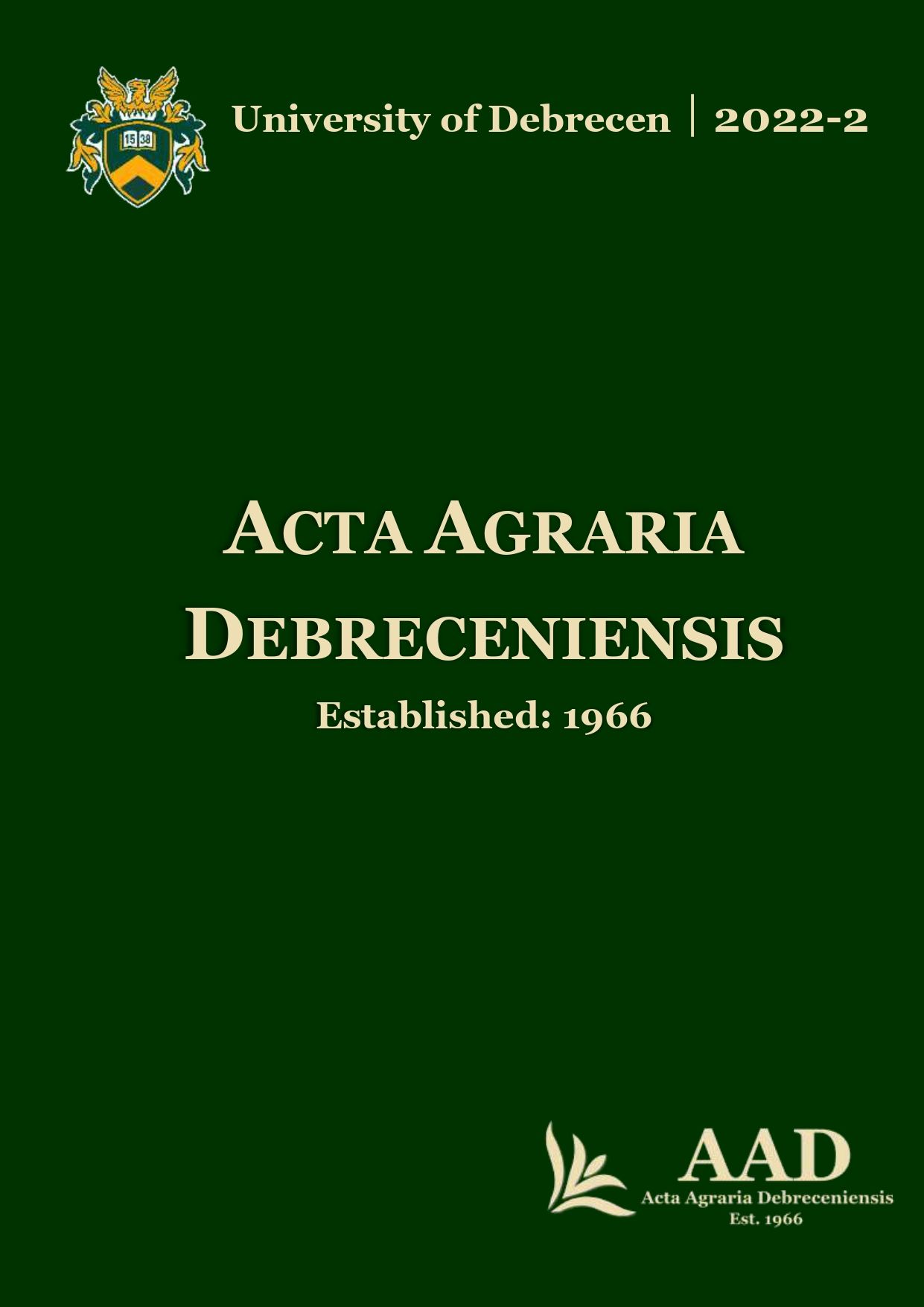Preliminary studies to evaluate the use of spectral data in monitoring of apple orchard parameters
Authors
View
Keywords
License
Copyright (c) 2022 by the Author(s)

This work is licensed under a Creative Commons Attribution 4.0 International License.
How To Cite
Accepted 2022-10-14
Published 2022-12-06
Abstract
The introduction/application of precision agricultural technologies has more important role in various fruit growing sectors among others apple growing. Remote sensing methods can detect electromagnetic waves where the green colour of the leaf is responsible for the chlorophyll content. The absorption of chlorophyll is in the wavelength range of 450–670 nm. Samples of apple tree leaves were taken on a weekly basis from the apple orchard at Horticultural Unit of Pallag on University of Debrecen in 2019 summer. Our studies were performed on 2 cultivars (Early Gold, Golden Reinders) and the samples were processed using 2 methodologies: a non-destructive spectral method and spectrophotometric method chlorophyll and carotenoid contents were calculated, which were created into some groups and compared with the spectral values. When the plant begins to lose strong green colour and turns yellow spectral measurements show that chlorophyll content decreases as the proportion of chlorophyll-carotenoid in the plant changes. In case of grouping into intervals, it can be observed that as the chlorophyll content increases the reflectance value decreases continuously due to the strong absorption. Based on the results, close relationship between the pigments can be detected.
References
- Burai, P.–Kovács, E.–Lénárt, Cs.–Nagy, A.–Nagy, I. (2009): Quantification of vegetation stress based on hyperspectral image processing. Cereal Research Communications. 37: 581–584.
- Droppa, M.–Erdei, S.–Horváth, G.–Kissimom, J.–Mészáros, A.–Szalai, J.–Kosáry, J. (2003.): Növénybiokémiai és élettani gyakorlatok. Budapesti Közgazdaságtudományi és Államigazgatási Egyetem, Budapest, 88.
- Ghobadi, M.–Taherabadi, S.–Ghobadi, M.E.–Mohammadi, G.R.–Jalai-Honarmand, S. (2013): Antioxidant capacity, photosynthetic characteristics and water relations of sunflower (Helianthus annuus L.) cultivars in response to drought stress. Industrial Crops and Products, 50, 29e38. DOI: 10.1016/j.indcrop.2013.07.009
- Gregersen, P.L.–Foyer, C.H.–Krupinska, K. (2014): In Biotechnological Approaches to Barley Improvement. Biotechnology in Agriculture and Forestry, J. Kumlehn and N. Stein (Eds.), Springer, Berlin, pp. 113–138. ISSN: 0934-943X
- Huete, A.R. (2004): Remote sensing from environmental monitoring. 2004, 183–206. DOI:10.1016/B978-012064477-3/50013-8
- Jung, A. (2005): Spektrális információk alkalmazása a városklíma-kutatásban. Doktori Értékezés. Budapest. 22–28.
- Kuska, M.T.–Behmann, J.–Mahlein, A.K. (2018): Potential of hyperspectral imaging to detect and identify the impact of chemical warfare compounds on plant tissue. Pure and Applied Chemistry. DOI: 10.1515/pac-2018-0102
- Lichtenthaler, H.K.–Wellbum, A.R. (1983): Determinations of total carotenoids and chlorophylls a and b of leaf extracts in different solvents. Biochem Soc Trans. 603: 591–592. DOI: 10.1042/bst0110591
- Milics, G.–Burai, P.–Lénárt, Cs. (2008): Pre-Harvest Prediction of spring barley nitrogen content using hyperspectral imaging. Cereal Research Communications, Supplement: 1863–1866.
- Nagy, A.–Riczu, P.–Juhász, Cs.–Tamás, J. (2014): Evaluability of apple orchard water balance parameters based on the spectral and thermographic parameters of the canopy. hungarian agricultural research: environmental management land use biodiversity. 2014:1 pp. 14–17.
- Nagy, A. (2015): Thermographic Evaluation Of Water Stress In An Apple Orchard. Journal of multidisciplinary engineering science and technology 2: 8 pp. 2210–2215. ISSN: 3159-0040
- Nagy, A.–Riczu, P.–Tamás, J. (2016): Spectral evaluation of apple fruit ripening and pigment content alteration. Scientia Horticulturae, 201: 256–264. DOI: 10.1016/j.scienta.2016.02.016
- Nemeskéri, E. (2011): Növényi morfológia szerepe az alma vízkészlet-gazdálkodásában. In: Tamás, J. (szerk.): Almaültetvények vízkészlet-gazdálkodása. Debreceni Egytem, AGTC, Kutatási és fejlesztési Intézet; Kecskeméti Főiskola, Kertészeti Főiskolai Kar. pp.49–52.
- Nemeskeri, E.–Sardi, E.–Kovacs-Nagy, E.–Stefanovits Banyai, E.–Nyeki, J.–Szabo, T. (2009): Studies on the drought responses of apple trees (Malus domestica Borkh.) grafted on different rootstocks. Int. J. Hortic. Sci. 15(1–2): 29–36. DOI: 10.31421/IJHS/15/1-2/809
- Neto, A.J.S.–Lopes, D.C.–Pinto, F.A.C.–Zolnier, S. (2017): Vis/NIR spectroscopy and chemometrics for non-destructive estimation of water and chlorophyll status in sunflower leaves. Biosystem engineering. 155(2017) 124–33. DOI: 10.1016/j.biosystemseng.2016.12.008
- Ördög, V.– Molnár, Z. (2011): Növényélettan. pp. 1–78.
- Riczu, P.–Nagy, A.–Tamás, J. (2014): Hyperspectral data in water stress detection. International Journal of Horticultural Science 2014, 20 (3–4): 15–17. DOI: 10.31421/IJHS/20/3-4/1126
- Roman, A.–Ursu, T. (2016): Multispectral satellite imagery and airborne laser scanning techniques for the detection of archaeological vegetation marks.
- Sircelj, J.–Grill, D.–Batic, F. (2007): Detecting different levels of drought stress in apple trees (Malus domestica Borkh.) with selected biochemical and physiological parameters pp. 362–369. DOI: 10.1016/j.scienta.2007.04.012
- Solovchenko, O.B.–Chivkunova, M.N.–Merzlyak, V.A. (2005): Relationship betweenchlorophyll and carotenoid pigments during on- and off- tree ripening of applefruits as revealed non-destructively with reflectance spectroscopy. PostharvestBiol. Technol. 38, 9–17.
- Usha, K.–Singh, B. (2013): Potential applications of remote sensing in horticulture e a review. Scientia Horticulturae, 153, 71–83. DOI:10.1016/j.scienta.2013.01.008
- Winkel-Shirley, B.J. (2002): Biosynthesis of Flavonoids and Effects of Stress. Current Opinion in Plant Biology 5(3):218–23 DOI: 10.1016/s1369-5266(02)00256-x
- Yu, K.Q.–Zhao, Y.R.–Liu, Z.Y.–Li, X.L.–Liu, F.–He, Y. (2014): Application of visible and near-infrared hyperspectral imaging for detection of defective features in loquat. Food Bioprocess Technology, 7, 3077–3087. DOI:10.1007/s11947-014-1357-z
- Zur, Y.–Gitelson, A.A.–Chivkunova, O.B.–Merzlyak, M.N. (2000): The spectral contribution of carotenoides to light absorption and reflectance in green leaves. Second International Conference on Geospatial Ingormation in Agriculture and Forestry. Lake Buena Vista Florida, 10–12 January 2000.

 https://doi.org/10.34101/actaagrar/2/8454
https://doi.org/10.34101/actaagrar/2/8454